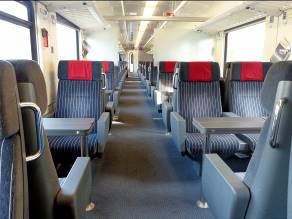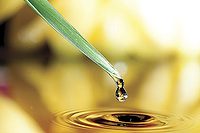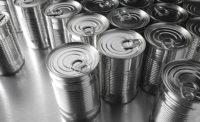Solvent-Free Artificial Resin Dispersion Achieves High Acoustic Effectiveness

When talking about travel comfort, it’s not only speed, comfortable seating and legroom that are important. A feeling of spaciousness within the train compartment or aircraft cabin is also important. Passengers who wish to work or rest undisturbed during their journey can choose quiet compartments in trains, where loud speaking, mobile phone use and other noisy activities are prohibited. In order to reduce the structure-borne noise of the rail carriages themselves and therefore to create the quietest-possible environment inside, many rolling stock manufacturers use sound deadening. The metal sheets used in the interior construction of carriages – for cladding for example – are covered in sound-deadening materials to dampen the noise caused by the metal sheets. The paint and coatings experts at griwecolor GmbH have two products in their portfolio that have been developed for this area of application: griwephon AN2-800 and griwephon light AN2-900.
The product range has now been expanded to include the new griwephon AN2-750/EU, which is classified as a non-flammable product, class A2, according to DIN EN 13501-1. The product passed the toxicological testing for use in rail vehicles with flying colors. All three ready-to-use one-component solutions have also been tested for fire behavior in accordance to EU rail vehicle standard DIN EN 45545-2. Griwephon AN2-800 and AN2-900 meet the requirement sets R1, R2, R3, R6, R7 and R17 in the hazard levels HL1, HL2 and HL3. Furthermore, all three products have a very high acoustic effectiveness in accordance with DIN EN ISO 6721-3.
Some people find that the monotonous noise produced by train wheels on the tracks makes them sleepy; others struggle to cut out external influences of this kind in order to sleep or work in a concentrated manner. Sound insulation and the reduction of structure-borne noise in rail vehicles to give passengers a relaxing journey is therefore a big challenge for engineers. Although some components can be produced from alternative materials, it is often not possible to avoid thin-walled sheet metal constructions, where significant vibration is unavoidable. This causes irritating background noises.

“The development of our sound-deadening griwephon AN2-750/EU is based on the extensive experience that we have collected with AN2-800 and AN2-900 as well as in the construction material sector,” reports Jörg Grieshaber, Managing Director Technology and Development at griwecolor GmbH. “With these products, we have gathered decades of know-how in the noise reduction of rail vehicles and façade elements or windows, which we have benefited from in the further development with regard to reduced smoke density and smoke gas toxicity as well as acoustic effectiveness and flame retardancy.”
AN2-750/EU has been classified as a non-combustible product, class A2, in line with DIN EN 13501-1. It has also passed the toxicity and smoke gas density test in line with the DB Systemtechnik specifications without a hitch. It therefore meets the requirement set R1 for HL1, HL2 and HL3 for application in rail vehicles with regard to smoke development and toxicity. Like the two variants already on the market, the sound deadening solution based on aqueous synthetic resin dispersion is also hydrophobic and solvent-free.
Sound Insulation Through Structure-Borne Noise Absorption
Large-scale sheet metal is often used in the manufacture of railway carriages. These vibrate when the train is moving, producing noise. This structure-borne noise spreads almost unhindered and without loss in metal vehicle components. These sound waves are then transmitted to the air so that the sound occurs as an audible noise inside the car.

In order to prevent this noise generation, which can be irritating, homogeneous layers are placed between the individual elements for internal damping. Thanks to its composition of inorganic components in conjunction with a low proportion of organic components, the girwecolor sound-deadening solution achieves a very high acoustic damping effect. When the griwephon layer penetrates the material to which it has been applied, the vibrational energy of the material is largely eliminated because it converts high-frequency vibrations into low-frequency ones. As a result, rail vehicle bodies emit less noise to the air in their interior space.
“Thanks to the special composition of our sound deadening, we achieve a very good value in terms of internal damping,” explains Grieshaber. “The loss factor, depending on the installation situation, application thickness and material in accordance with DIN EN ISO 6271-3, is between 0.22 and 0.24, so that large parts of the structure-borne noise energy are absorbed by the sound deadening.” Thanks to the application of a filler combination made of various mineral substances, such as aluminum hydroxide, as well as the development of a special binder with high toughness, an application thickness in double sheet thickness up to 5 mm is possible. The quality of the filler and the unusual layer thickness are jointly responsible for the high absorption rate. Another advantage of the mineral components is their low thermal conductivity.
Easy Processing Without Health Risks
“As with all of our products, we have also paid attention with griwephon AN2-750/EU, AN2-800 and AN2-900 to environmental and health compatibility and easy application,” explains Grieshaber. “On the basis of an aqueous synthetic resin dispersion, we do completely without solvents in order to achieve the lowest possible VOC proportion. Through intensive development work, we were able to achieve a value of less than 0.6 g/liter.” Thanks to its composition, the sound-deadening solution can be applied both with airless devices, with a ratio of at least 60:1, and with reciprocating pump devices, with atomizing air of roughly 12:1, or screw conveyors with atomizing air with an inlet pressure of 3 to 4 bars. Manual application using a spatula or mortar adhesive trowel is also possible. The sound-deadening solution is characterized by a high level of stability when applied to vertical surfaces. In wet application, a layer thickness of up to 5 mm is possible in one go, without the product slipping off or cracks forming on the surface.

After the drying process, the layer thickness is approximately 4 to 4.5 mm. “The processing is therefore quick, safe, clean and does not contain any health risks due to the ingredients,” summarizes Grieshaber. “Even in the case of a fire, griwephon AN2-750/EU does not generate any toxic gases. The material was tested in accordance with DIN EN 45545-2 with very good results with regard to smoke density and smoke gas toxicity. Our griwephon sound deadening therefore connects fire protection with simple handling and efficient noise protection.”
For more information, visit www.griwecolor.de.
Looking for a reprint of this article?
From high-res PDFs to custom plaques, order your copy today!







